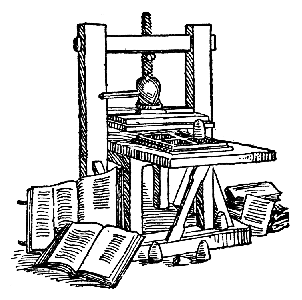A war for mind share is going on around us. Ideas struggle for the territory in our
brains. In Part 2 of Meme Wars we
examine how printing technology started a war between memes.
German Information
Revolution
 |
| Hand crafted meme |
Prior to Gutenberg’s
popularization of printing presses, communication was largely by hand or
mouth. Scratching surface of clay,
putting ink on papyrus, and carving in stone where skilled manual labors that
few could master.
Access to communication was limited to those with wealth or
power. This focused writing for future minds
and listening to past minds on a small subset of humanity.
The printing press took the power of communication from the
hands of a few and democratized it. Meme’s
could spread from central places to many minds.
Before printing presses (about 1450) there were only a few
thousand books in all of Europe . A hundred years after Gutenberg’s invention,
there were 20 million. By 1650 200 million books had
come into existence. Literacy, listening to past minds and speaking to future
ones, became common.
Before mass printing, Bibles where read almost exclusively
by priests and nobles. These fountains
of wisdom were under tight control. The
Church doctrine was that lay
people would not understand the Bible’s mysteries and should be sheltered
from actually reading its words for themselves.
It is no accident that a Protestant Reformation occurred
when it did. Among the first mass
produced books were Bible translations from Latin into local languages. Within three generations, Church thought
control was challenged
by Martin Luther.
The meme’s of the Bible spread and flourished into fertile
and unfilled minds. This initial wave of
meme growth had profound effects on culture, thought, and how people lived.
As literacy spread, wisdom became democratized. Access to information promoted independent
thinking. As more people came to read
past minds, they changed their futures.
 |
| Gutenberg's meme reproducer |
With the printing press came an immediate and overwhelming
demand for new content. Previously written
books were mass produced profitably. New
content was rare, old content readily available. Ancient Roman and Greek books
became the stock and trade of these new high tech printing firms.
Reading the minds of the long ago dead became common and
easy. The ancients spoke to people about
philosophy, mathematics, and politics.
Old ideas created revolutionary new memes jumping from mind to mind.
Challenging Church’s interpretation of the Bible, people
began to challenge other ideas. Copernicus revealed
the earth was not the center of the universe.
Columbus
sailed beyond the known, finding new lands.
Northern Italy began to
discover and translate Roman and Greek knowledge beyond the Bible.
With each new discovery of ideas from past minds, new ideas
were explored. When people read good
thoughts from the past, society can benefit.
Good memes entered into to peoples brains and were passed around.
Machiavelli, after
reading Plato and Aristotle, described a world of princes acting outside of
religious doctrine and control. Reading
Roman thoughts from long ago, the first Republic in a thousand years formed in Florence. The humanist movement
sprung from revived ancient ideas that each person could study poetry, grammar,
history, morality and rhetoric to advance their lives and their communities.
When people read bad thoughts from the past, society can be
hurt. Bad memes fight for a share of
mind and communication with good memes.
Nostradamus
published prophecies that distorted later minds with false ideas about the
future. Reading from the mind of Dante, irrational
concepts of hell placed irrational fear into ignorant brains. Ancient ideas of leech bleeding and laxatives
killed thousands as old misconceptions about medicine
became popularized.
In part 3 of Meme Wars looks at power struggles between
ideas/memes occurring in renaissance minds.
No comments:
Post a Comment